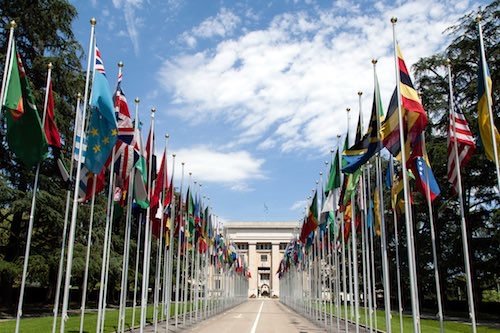As peace negotiations to end Russia’s war in Ukraine continue behind closed doors, a dangerous shift in the tone and terms of international diplomacy is becoming increasingly visible. At stake is not only the future of Ukraine and the fate of those already suffering from war crimes and political repression, but the very foundation of the post-World War II international order.
Human rights defenders — from Kyiv to Moscow, from The Hague to New York — are sounding the alarm: the rule of law and human rights must not be sacrificed on the altar of expedient peace.
A Campaign to Put People First
In January 2025, leading human rights organizations launched the “People First” campaign, urging negotiators to prioritize humanitarian issues: the release of prisoners of war, justice for illegally detained Ukrainian citizens, the return of abducted Ukrainian children, and the freedom of Russia’s political prisoners.
READ MORE: Political Upheaval in the Solomon Islands: Former PM Sogavare Forms New Coalition
A month later, on the third anniversary of Russia’s full-scale invasion of Ukraine, UN special rapporteurs echoed this call, reminding the global community that Russia must be held accountable — not only for the war itself but also for the decades of domestic repression that enabled such aggression in the first place.
Today, there are over 3,000 political prisoners in Russia. Many face torture, endure life-threatening conditions, or die in custody. This systemic violence, normalized within Russia’s borders, now threatens to become a template for global conflict resolution, should the current negotiations drift away from the legal frameworks that have historically guided the pursuit of peace.
A Legacy at Risk
The 20th century’s greatest humanitarian achievement — the development of international human rights law — is now in jeopardy. In the aftermath of the two World Wars, countries came together to build institutions such as the United Nations, the European Court of Human Rights, and the Organization for Security and Co-operation in Europe (OSCE). These were not perfect systems, but they established norms of behavior: respect for sovereignty, the prohibition of aggression, and the inalienable rights of individuals regardless of race, nationality, or political opinion.
The Universal Declaration of Human Rights and the Helsinki Final Act of 1975 bound peace and security to human dignity. It was this consensus that helped prevent World War III, moderated the Cold War, and nurtured an era of relative stability and development in Europe.
Following the collapse of the Soviet Union, former socialist republics — including Russia — embraced democratic reforms and joined this global order. Courts, constitutions, and civil liberties bloomed, if briefly. But as history has since revealed, this progress was neither linear nor irreversible.
The Collapse of Principles in Practice
The 2022 invasion of Ukraine marked not just a geopolitical rupture, but a philosophical assault on the modern international order. The Kremlin’s reliance on brute force, the justification of aggression through propaganda, and the erasure of dissent at home exemplify a worldview where might equals right.
This logic — where sovereignty is a suggestion, treaties are optional, and rights are expendable — is now being mirrored by the new U.S. administration, which has signaled a willingness to abandon legal principles in favor of strategic bargaining.
This shift recalls the darkest chapters of Russian authoritarianism. For Russian human rights defenders, this isn’t theoretical: it’s the world they’ve lived in for the last 25 years, under a regime that elevated state interest above human dignity, crushed opposition, and replaced law with coercion.
A Deal Without Justice Is No Peace at All
Efforts to resolve the war in Ukraine must not confuse neutrality with fairness. By treating Russia — the aggressor — as an equal party to Ukraine, the victim, the negotiations risk rewarding war crimes and creating a dangerous precedent.
A so-called “peace deal” that ignores legal accountability would normalize military aggression, embolden other authoritarian regimes, and destabilize global norms. It would also deliver a devastating blow to dissidents within Russia, who have risked their lives to speak out.
As Andrei Sakharov, the Nobel Peace Prize-winning physicist and human rights defender, once said:
“Peace, progress, human rights — these three goals are inseparably linked. You cannot achieve one without the other two.”
If today’s leaders pursue peace without justice, they will ultimately lose all three.
The Stakes: Beyond Ukraine
What happens now in Ukraine will echo globally. Should human rights and international law be cast aside in favor of “deals” that serve short-term political interests, the world will regress to a state where power, not principle, dictates outcomes.
Such an outcome risks reawakening the conditions that led to both world wars: shifting alliances, unchecked militarism, and the abandonment of diplomatic norms. It would threaten democracy, accountability, and human security in every region — from Eastern Europe to East Asia.
Authoritarian leaders everywhere would take note. The message would be clear: violence works, international law is optional, and repression pays off.
A Call to Democratic States and Civil Societies
We call upon:
- Democratic leaders to reaffirm their commitment to international human rights law and the UN Charter.
- Negotiators to ensure that humanitarian issues, such as prisoners, civilians in occupied territories, and deported children, are central to all discussions.
- Civil society and global citizens to hold their governments accountable for defending justice, not only peace.
Negotiations must be rooted in the principles outlined in the Helsinki Final Act: sovereignty, territorial integrity, and human rights as cornerstones of peace and security.
There Will Be No Peace Without Law
Only by upholding international legal standards can we ensure a just and sustainable peace. Only by defending human rights can we create a world where wars of aggression are deterred, and the dignity of individuals is protected.
The alternative — a world without rules — is not peace. It is the return of chaos, repression, and war.
